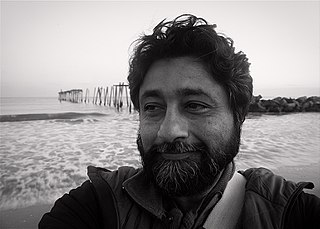Related Research Articles
Bioethics is both a field of study and professional practice, interested in ethical issues related to health, including those emerging from advances in biology, medicine, and technologies. It proposes the discussion about moral discernment in society and it is often related to medical policy and practice, but also to broader questions as environment, well-being and public health. Bioethics is concerned with the ethical questions that arise in the relationships among life sciences, biotechnology, medicine, politics, law, theology and philosophy. It includes the study of values relating to primary care, other branches of medicine, ethical education in science, animal, and environmental ethics, and public health.

Jewish ethics is the ethics of the Jewish religion or the Jewish people. A type of normative ethics, Jewish ethics may involve issues in Jewish law as well as non-legal issues, and may involve the convergence of Judaism and the Western philosophical tradition of ethics.
In philosophy and neuroscience, neuroethics is the study of both the ethics of neuroscience and the neuroscience of ethics. The ethics of neuroscience concerns the ethical, legal, and social impact of neuroscience, including the ways in which neurotechnology can be used to predict or alter human behavior and "the implications of our mechanistic understanding of brain function for society... integrating neuroscientific knowledge with ethical and social thought".
Joseph J. Fins, M.D., D. Hum. Litt., M.A.C.P., F.R.C.P. is an American physician and medical ethicist. He is chief of the Division of Medical Ethics at New York Presbyterian Hospital and Weill Cornell Medical College, where he serves as The E. William Davis Jr., M.D. Professor of Medical Ethics, and Professor of Medicine, Professor of Public Health, and Professor of Medicine in Psychiatry. Fins is also Director of Medical Ethics and an attending physician at New York Presbyterian Hospital-Weill Cornell Medical Center. Fins is also a member of the adjunct faculty of Rockefeller University and has served as Associate for Medicine at The Hastings Center. He is the Solomon Center Distinguished Scholar in Medicine, Bioethics and the Law and a Visiting Professor of Law at Yale Law School. He was appointed by President Bill Clinton to The White House Commission on Complementary and Alternative Medicine Policy and currently serves on The New York State Task Force on Life and the Law by gubernatorial appointment.

Edmund Daniel Pellegrino was an American bioethicist and academic who served as the 11th president of The Catholic University of America (CUA) from 1978 to 1982. For 35 years, Pellegrino was a distinguished professor of medicine and medical ethics and the Director of the Kennedy Institute of Ethics at Georgetown University. Pellegrino was an expert both in clinical bioethics, and in the field of medicine and the humanities, specifically, the teaching of humanities in medical school, which he helped pioneer). He was the second layman to hold the position of President of Catholic University.
Helen S. Mayberg, is an American neurologist. Mayberg is known in particular for her work delineating abnormal brain function in patients with major depression using functional neuroimaging. This work led to the first pilot study of deep brain stimulation (DBS), a reversible method of selective modulation of a specific brain circuit, for patients with treatment-resistant depression. As of August 2019, she has published 211 original peer-reviewed articles, 31 books and book chapters, and acted as principal investigator on 24 research grants. Mayberg is coinventor with Andres Lozano of “Method for Treating Depression Mood Disorders and Anxiety Disorders using Neuromodulation,” US patent 2005/0033379A1. St. Jude Medical Neuromodulation licensed her intellectual property to develop Subcallosal Cingulate Deep Brain Stimulation for Treatment-Resistant Unipolar and Bipolar Depression for the treatment of severe depression. As of 2018, Mayberg holds positions as Professor of Neurology and Neurosurgery and Professor, Psychiatry and Neuroscience, both at Mount Sinai Medical School, and Professor of Psychiatry, Emory University; Emory University Hospital. Since 2018, she has served as Director, Nash Family Center for Advanced Circuit Therapeutics at the Icahn School of Medicine at Mount Sinai.
Albert R. Jonsen was one of the founders of the field of Bioethics. He was Emeritus Professor of Ethics in Medicine at the University of Washington, School of Medicine, where he was Chairman of the Department of Medical History and Ethics from 1987 to 1999. After retiring from UW, he returned to San Francisco, where he co-founded the Program in Medicine and Human Values at Sutter Health's California Pacific Medical Center in 2003.
The following outline is provided as an overview of and topical guide to ethics.

The National Core for Neuroethics at the University of British Columbia was established in August 2007, with support from the Canadian Institutes of Health Research, the Institute of Mental Health and Addiction, the Canada Foundation for Innovation, the British Columbia Knowledge Development Fund, the Canada Research Chairs program, the UBC Brain Research Centre and the UBC Institute of Mental Health. Co-founded by Judy Illes and Peter Reiner, the Core studies neuroethics, with particular focus on ethics in neurodegenerative disease and regenerative medicine, international and cross-cultural challenges in brain research, neuroimaging and ethics, the neuroethics of enhancement, and personalized medicine.

Jacob M. Appel is an American polymath, author, bioethicist, physician, lawyer and social critic. He is best known for his short stories, his work as a playwright, and his writing in the fields of reproductive ethics, organ donation, neuroethics, and euthanasia. Appel's novel The Man Who Wouldn't Stand Up won the Dundee International Book Prize in 2012. He is the director of Ethics Education in Psychiatry and a professor of psychiatry and medical education at the Mount Sinai School of Medicine, and he practices emergency psychiatry at the adjoining Mount Sinai Health System. Appel is the subject of the 2019 documentary film Jacob by director Jon Stahl.
Judy Illes,, PHD, FRSC, FCAHS, is Professor of Neurology and Distinguished University Scholar in Neuroethics at the University of British Columbia. She is Director of Neuroethics Canada at UBC, and faculty in the Brain Research Centre at UBC and at the Vancouver Coastal Health Research Institute. She also holds affiliate appointments in the School of Population and Public Health and the School of Journalism at UBC, and in the Department of Computer Science and Engineering at the University of Washington in Seattle, WA. USA. She was appointed a member of the Order of Canada in 2017.
Stephen Garrard Post has served on the Board of the John Templeton Foundation (2008-2014), which focuses on virtue and public life. He is a researcher, opinion leader, medical school professor, and best-selling author who has taught at the University of Chicago Medical School, Fordham University-Marymount, Case Western Reserve University School of Medicine (1988-2008) and Stony Brook University School of Medicine (2008-). He is widely known for his research on the ways in which giving can enhance the health and happiness of the giver, how empathy and compassionate care contribute to patient outcomes, ethical issues in caring for people with dementia, medical professionalism and the virtues, and positive psychology in relation to health and well-being. Post is an elected member of the College of Physicians of Philadelphia, the New York Academy of Medicine, and the Royal Society of Medicine, London. He was selected nationally as the Public Member of the United States Medical Licensing Examination (USMLE) Composite Committee (2000-2005), and was reappointed for outstanding contributions.

Anjan Chatterjee is a professor of neurology at the Perelman School of Medicine at the University of Pennsylvania. He is director of the Penn Center for Neuroaesthetics (PCfN) and a member of the Center for Cognitive Neuroscience. His research focuses on spatial cognition and its relationship to language. He also conducts neuroaesthetics research and writes about the ethical use of neuroscience findings in society.
John Loike is an American research biologist and bioethicist at Touro University.
The International Neuroethics Society (INS) is a professional organization that studies the social, legal, ethical, and policy implications of advances in neuroscience. Its mission is to encourage and inspire research and dialogue on the responsible use of advances in brain science. The current INS President is Joseph J. Fins, MD.

Ilina Singh is a Professor of Neuroscience & Society at the University of Oxford, England, United Kingdom. She is also a co-director at the Wellcome Trust Centre for Ethics and the Humanities, and a research fellow at the National Institute for Health Research (NIHR) Oxford Health Biomedical Research Centre.
Robert Joseph BuchananKM+ is an American neurosurgeon, psychiatrist, and bioethicist who is best known for his contributions to the field of neuroscience, psychosurgery, and neuroethics. He is an associate professor of neurosurgery at Dell Medical School, University of Texas at Austin and maintains courtesy associate professor appointments in the school's department of neurology and department of psychiatry and behavioral sciences.
References
- ↑ Illes, Judy (2009). "Neurologisms". The American Journal of Bioethics. 9 (9): 1. doi:10.1080/15265160903192557. PMID 19998176. S2CID 219641790.
- ↑ "Governance". International Neuroethics Society. Archived from the original on October 6, 2014. Retrieved September 28, 2014.
- ↑ Carroll, Janell L.; Wolpe, Paul Root (January 1, 1996). Sexuality and gender in society. New York: HarperCollins College Publishers. ISBN 978-0065008722.
- ↑ Reconstructionist Rabbinical College Center for Jewish Ethics (March 1, 2002). Wolpe, Paul Root; et al. (eds.). Behọref hayamim = In the winter of life : a values-based Jewish guide for decision making at the end of life. Wyncote, PA: Reconstructionist Rabbinical College Press. ISBN 978-0938945062.